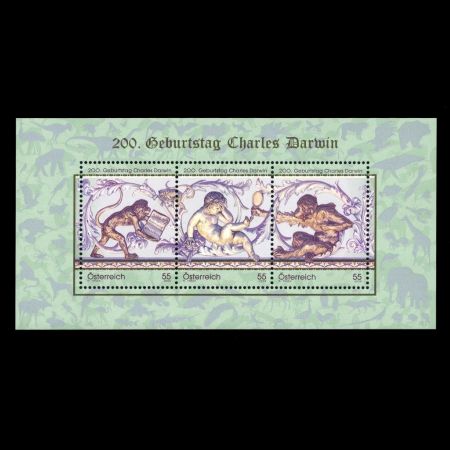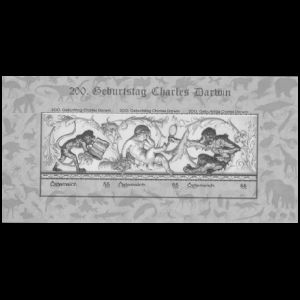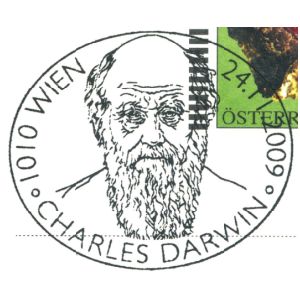Austria 2009 "200th anniversary of birth of Charles Darwin"
| Issue Date |
24.11.2009 |
| ID |
Michel: Bl. 57
Scott: 2234,
Stanley Gibbons: MS3009,
Yvert et Tellier: BF59,
Category: Dw |
| Designer |
Robert Trsek |
| Stamps in set |
3 |
| Value |
Euro 0.55 x3 |
| Emission/Type |
commemorative |
| Issue place |
Vienna |
| Size (width x height) |
stamps: 29.6mm x 38.5mm
Mini-Sheet: 130mm x 65mm
|
| Layout |
3 stamps in block |
| Products |
FDC x1 |
| Paper |
|
| Perforation |
14 x 13.75 |
| Print Technique |
Lithography + photogravure, multicolor |
| Printed by |
Österreichische Staatsdruckerei GmbH |
| Quantity |
250,000 Mini-Sheets |
| Issuing Authority |
Osterreich Post AG |

On 24
th November, 2009, the Post of Austria, issued the stamp
"200
th anniversary of birth of Charles Darwin"
As the founder of modern evolutionary theory, Charles Darwin (1809-1882) is without doubt one of the most
important scientists of all times.
His work had a fundamental influence on biology and geology include paleontology and was of major
importance for subsequent ideas.
After an averagely successful school career and the abandonment of his university studies, the life of the
young Charles Darwin was to change fundamentally on December 27, 1831.
It was on this day that he became a member of a voyage of discovery that he later referred to as “by far
the most important event in my life”.
On HMS Beagle under Captain Robert FitzRoy, Darwin spent five years travelling and exploring the world:
the Cape Verde Islands, the Falkland Islands, the coast of South America, the Galapagos Islands, Patagonia,
South Africa, Mauritius, etc.
On his return he not only brought a Galapagos turtle with him (which incidentally only died in November 2006
at the age of 176), but a mass of drawings and findings that were to form the basis for his most important
work, “The Origin of the Species".
This book was published in 1859 and sold out almost immediately.
Sceptics criticised his theory (and still do) as blasphemous, since, contrary to the Christian story of
creation, Darwin argued that the various species were the consequence of adjustments to their habitat
(“survival of the fittest”) and had thus developed in different directions.
The scientific world, however, quickly acknowledged the sensational and well-founded conclusions.
Charles Darwin, who later became a member of the Royal Society, published around 20 further works in the
course of the years, ranging from studies on coral reefs, meat-eating plants and orchids to the origin of
mankind, his no doubt most disputed scientific theory.
There is no doubt that his revolutionary discoveries (and his often caricatured ideas) give Charles Darwin
a strong presence even today; they are still deeply rooted in public awareness.
Thus in 1982, Darwin took 16
th place in the list of the most influential persons in history,
while in
Great Britain, he was placed fourth of the
"100 greatest Britons”.
200 years after Darwin's birth, the theory of evolution he founded and that has since been continuously
further developed, forms the fundamental paradigm for biology.
Thanks to it, all the biological subdisciplines such as zoology, botany, behavioral research, embryology
and genetics are brought under one roof- according to the oft quoted sentence “Nothing in biology makes
sense except in the light of evolution”.
This new commemorative block is a tribute to one of the greatest researchers of all times.
Products
Notes:
[1] The Black Print is an ungummed, imperforate proof printed in black from the original printing plates.
Black prints were distributed by the Austrian Post but are not valid postage.
References
Information brochure of Austrian Post (in German, English and French)
Acknowledgements
Many thanks to
Dr.
Peter Voice from Department of Geological and Environmental Sciences, Western Michigan University, for his help to find an information for this article,
the draft page review and his very valuable comments.





